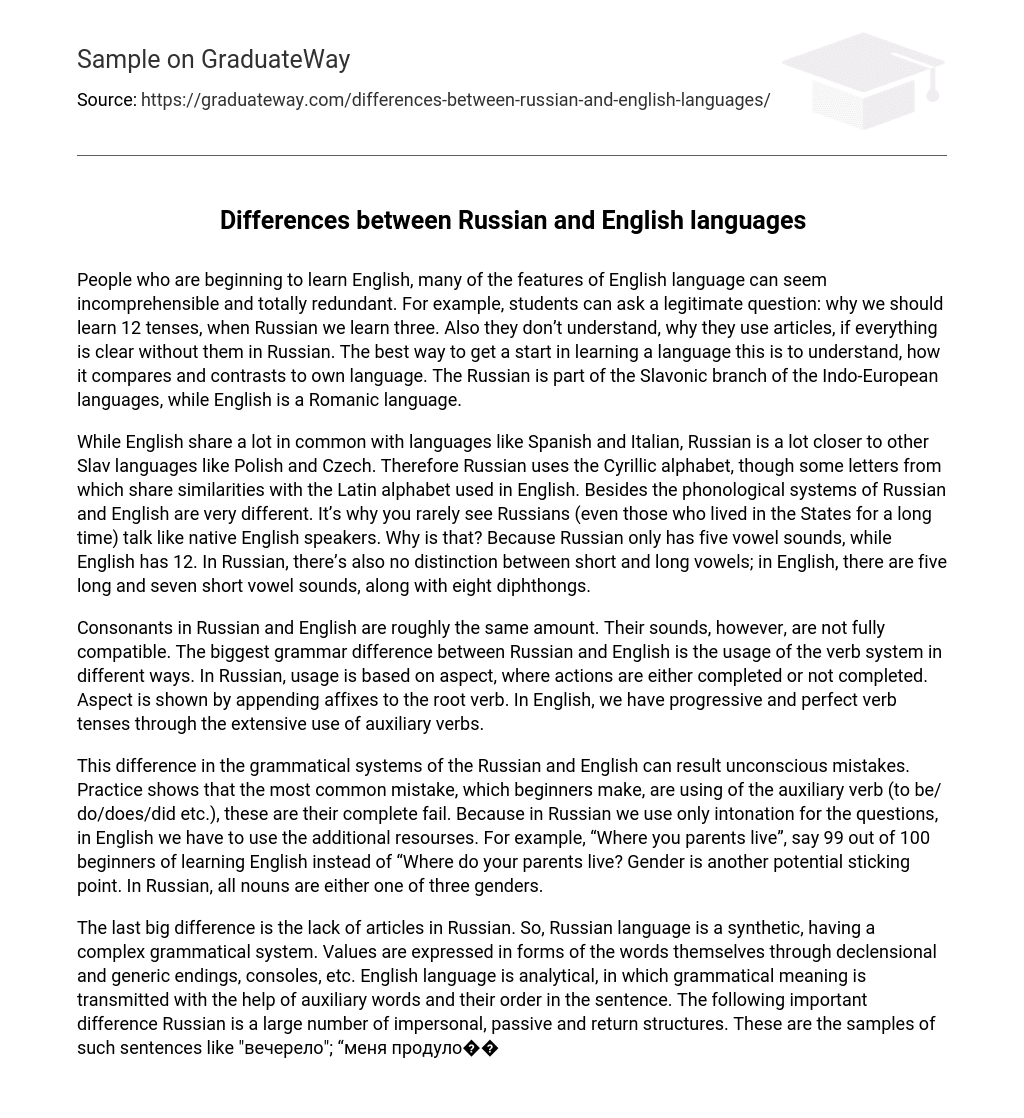When starting to learn English, many people are often confused and see some parts of the language as unnecessary. Students frequently ask why it’s important to know 12 tenses in English when only three are learned in Russian. Another aspect that causes confusion is the use of articles, which aren’t necessary in Russian. To effectively learn a new language, it’s best to compare and contrast it with your native language. Russian belongs to the Indo-European Slavonic languages group while English is a Romanic language.
English and Russian have similarities with languages like Spanish, Italian, Polish, and Czech. However, Russian is particularly closer to other Slavic languages such as Polish and Czech. This closeness leads to the use of the Cyrillic alphabet in Russian, although some letters resemble those used in the Latin alphabet. The phonological systems of Russian and English differ significantly, which means that Russians (even those who have lived in the United States for a long time) rarely speak like native English speakers. This difference primarily arises from the fact that Russian has only five vowel sounds compared to English’s 12. Furthermore, while English distinguishes between short and long vowels with its five long vowel sounds, seven short vowel sounds, and eight diphthongs; Russian does not make this distinction.
Although Russian and English have a similar quantity of consonants, their sounds are not completely compatible. The main grammatical distinction between the two languages is found in the verb system usage. In Russian, this usage is determined by aspect, which indicates whether actions are completed or not completed. This aspect is signaled by affixes added to the root verb. On the other hand, English utilizes progressive and perfect verb tenses extensively through the use of auxiliary verbs.
The grammatical systems of Russian and English differ, leading to unconscious mistakes. Beginners often make the mistake of using the wrong auxiliary verb (to be/ do/does/did etc.), which is a complete failure. Unlike Russian, English requires the use of additional resources for questions. For instance, instead of saying “Where do your parents live?”, 99 out of 100 beginners learning English incorrectly say “Where you parents live”. Gender is another potential issue, as Russian nouns are categorized into three genders.
The absence of articles in Russian sets it apart from English, making Russian a synthetic language with a complex grammatical system. In Russian, values are expressed within words themselves through declensional and generic endings, consoles, etc. Conversely, English is an analytical language that conveys grammatical meaning by using auxiliary words and sentence structure. Another notable difference in Russian is the prevalence of impersonal, passive, and reflexive structures. For instance, phrases like “вечерело” (metaphrase: “It’s getting late”) and “меня продуло” (metaphrase: “I got cold”) require including the subject and action in translation. Moreover, Russian encompasses a wide range of negative constructions such as “Я не мог сказать ему об этом” (metaphrase: “I couldn’t tell him about this”) or “Не знаете ли вы, который час” (metaphrase: “Don’t you know what time it is?”). In English, these sentences would be translated to affirmative forms: “I had to tell him about that” and “Do you know what time it is?”. Additionally, it should be noted that clear and concise communication is considered good etiquette in English while excessive embellishments and florid language are discouraged.
The length of Russian sentences is typically 30-40% longer than English sentences. One key difference between the two languages is the strict word order in English sentences, which follows a subject-predicate (action)-object structure. In contrast, Russian is generally a more straightforward language with a prevalence of modality in statements. This means that Russians tend to express their judgments more harshly than British or Americans. Therefore, it is important in English to use constructions that express uncertainty or varying degrees of probability, such as modal verbs like “seems to” or “would think”. The purpose of this text is to describe important differences between Russian and English for beginners who are learning English. Most importantly, students should know that as we study more, English becomes less difficult.





